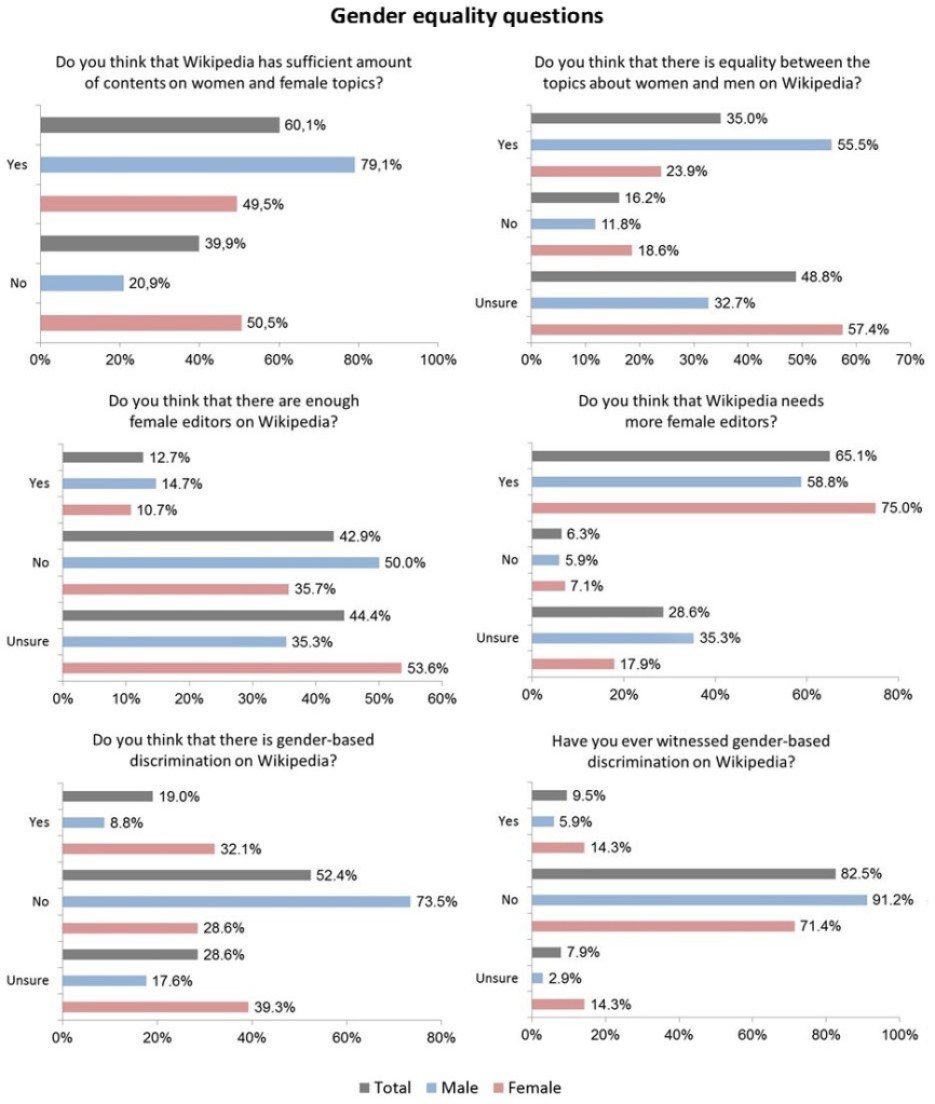
In the period from 28 September to 25 October 2020, the Macedonian Wikipedia community, synchronously with the Serbian Wikipedia community, conducted a Gender equality survey in order to measure the public opinion of gender equality on Wikipedia among Macedonian speakers. The questionnaire consisted of 21 questions divided into three sections — Introduction, Editors and Readers — specifically defined to target both editors and readers.
A total of 303 filled-in copies of the questionnaire were submitted, with 62.0 per cent of the respondents having self-identified as female, 36.3 per cent as male and 1.7 per cent as other. The majority of those surveyed (76.2 per cent) are under the age of 40 and almost a third belonged in the age group from 18 to 30 years. Only 20.8 per cent of the respondents indicated editing experience on Wikipedia and were surveyed as editors in addition to readers. As regards the gender, 30.9 per cent of the males and 14.9 per cent of the females have ever edited Wikipedia.
Content gender equality in place but more females welcomed
The questionnaire included two questions on gender equality intended for all readers — the first about whether contents on women and female topics are sufficiently covered and the second about whether there is equality between the coverage of topics on men and women. The results obtained from the answers on both questions point out to a well established gender equality in the project. A share of 60.2 per cent think that women and female topics are sufficiently covered, yet there are noticeable differences between the views held by males and females. Similarly, the gender equality in coverage is supported by 35.0 per cent against 16.2 per cent who think there is inequality, while 48.8 per cent were unsure or could not give a proper answer.
Editors were given additional questions on gender equality relating the participation of female editors and the existence of gender-based discrimination. The results strongly suggest that there are not enough female editors and that there should be more, albeit with a significant number of respondents who were sure or could not answer. Only 19.0 per cent opine that there is gender-based discrimination on the project, while 52.4 per cent hold the view that such thing does not exist on the project. A vast majority of above 80 per cent of the surveyed editors stated that they had never faced or witnessed any instance of gender-based discrimination on the project. The figures are high for both male (above 90 per cent) and female editors (above 70 per cent).
A large majority of editors (69.8 per cent) indicated that they have edited biographies, with 79.4 per cent of the male and 57.1 per cent of the female editors responding with affirmation. The number of those editing contents on women and female topics makes up 46.0 per cent of the surveyed with almost equal results for males and females.

Motives to edit and reasons to stop editing Wikipedia
Apart from gender equality as the main focus of the survey, editors were asked a couple of questions related to their motives and barriers to edit Wikipedia.
The most common motives to start editing Wikipedia that were indicated in the survey include: correcting a noticed mistake (28.6 per cent), discovering a familiar uncovered topic (20.6 per cent), admiration of the idea to voluntarily spread free knowledge (17.5 per cent) and participation in a project involving editing Wikipedia (14.3 per cent).
On the question about the motives that still keep editors on Wikipedia, the most popular answers are the following: contributing to a familiar topic (20.6 per cent), correcting noticed mistakes (17.5 per cent), writing non-existing articles (15.9 per cent), admiration of the idea about free knowledge and open access to information (15.9 per cent), popularising topics deemed as important (7.9 per cent) and editing makes fun (7.9 per cent).
A share of 73.0 per cent of the surveyed editors pointed out that the lack of time might be the biggest reason to stop editing in the next six months, while the rest have given other reasons.

Can you help us translate this article?
In order for this article to reach as many people as possible we would like your help. Can you translate this article to get the message out?
Start translation